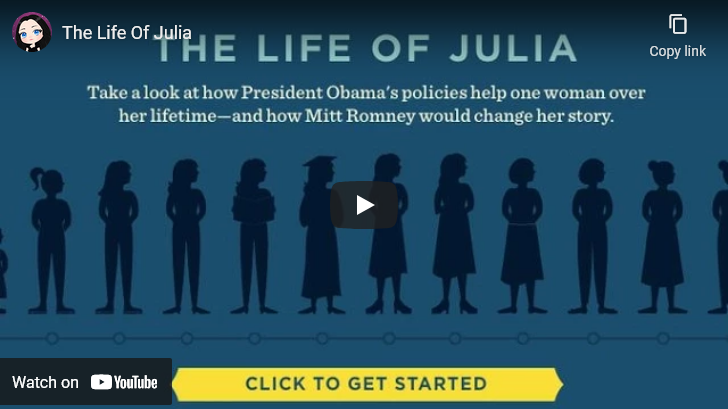If you don’t remember the amazing life story of Julia Faceless, here’s Chris Bray to refresh your memory:
In 2012, the Obama campaign released a cartoon depiction of the choice America was facing, boiled down to a single figure: The Life of Julia.
Julia was actually, literally faceless, and entirely alone, traveling through life without family, friends, or colleagues. But ahh, like the story about the guy who asks God about the two sets of footprints, Julia wasn’t alone alone: She was supported, at all times, by the endless beneficence of the centralized state, our one true parent and deity, the very lifesource. She was able to begin learning as a child because Barack Obama gave her a HeadStart program; she was able to start a business as an adult because Barack Obama gave her an SBA loan. The God-Patriarch Barack walked with her always, enabling her to live, giving her the substance of her life.
That’s how it works, of course: You need programs so you can do stuff. How can a human being possibly reproduce without government programs to support and subsidize reproduction? It’s a biological impossibility — as is well known, the uterus isn’t even activated until the first government check arrives. You can’t do things on your own, and you certainly can’t do things with the informal support of family, friends, or community. Life requires the empowerment that comes with formalized systems of dependency.
Chris then follows up an earlier post on the administration’s muscular deconstruction of student-led activities and organizations at Stanford with some further evidence that even at the college campus level, deliberate infantilization of adults continues at an ever-increasing pace. Adulting is hard, man!
That’s way beyond you, poor debilitated child. Why don’t you try something that’s within your range of ability, like going for a walk around campus? You know, we have a formal organization that can support you in the attempt. To take a walk. Here. On campus.
The message of stories like this, and the message of the administrative actions they describe, is a message of weakness, fearfulness, debilitation, and dependency: You can’t. Imagine telling a healthy twenty year-old that he shouldn’t try to go camping in the mountains, ’cause it’s probably just way too hard for him. See, Stanford’s student life administrators are helping.
What you’re doing in your late teens and early twenties, whether you go to college or not, is learning adulthood — acquiring habits of independence and resourcefulness that you’ll carry for the rest of your life. (Ideally your parents will already deliver you to legal adulthood with a big part of this training already in place.) The message, don’t try to take a trip to the mountains, it’s too hard for you, is a knife in the heart of that journey. It’s a disgusting and shameful thing to communicate to young adults.




